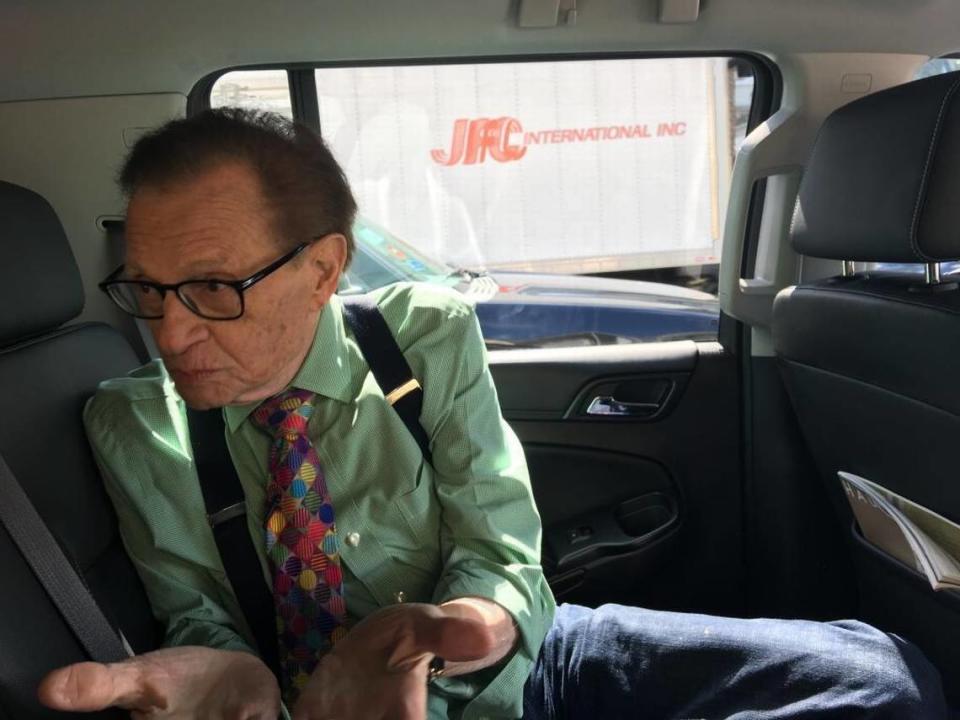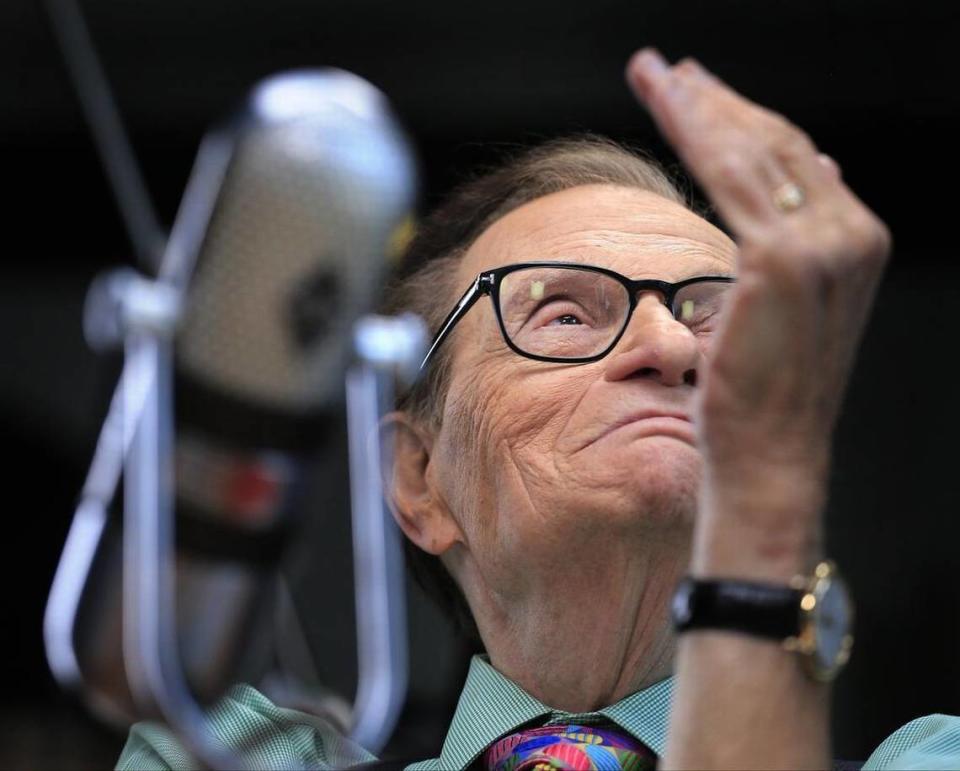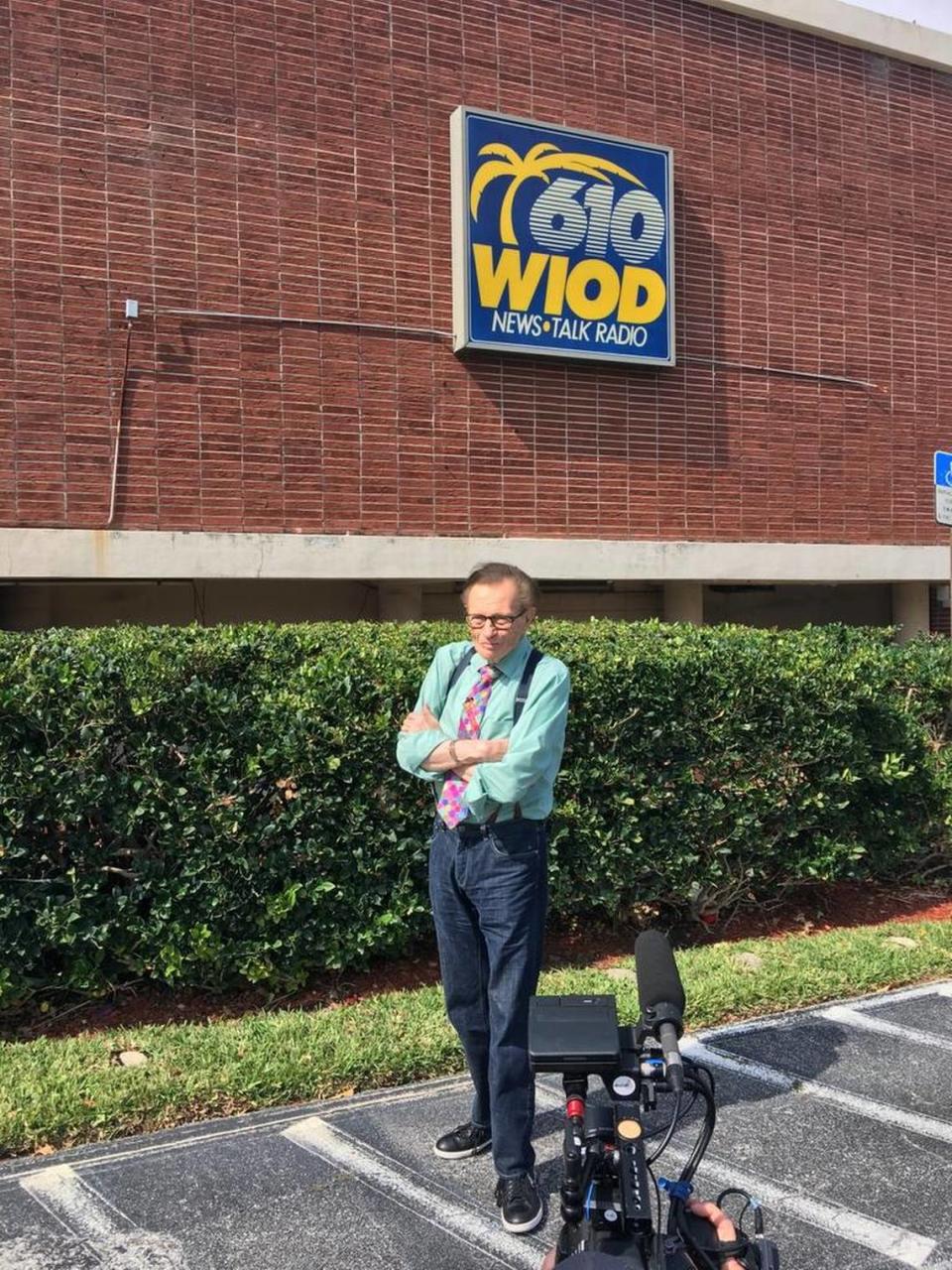Larry King, whose legendary broadcasting career began on Miami radio, dies at 87
A few years ago, TV and radio host Larry King celebrated the 60th anniversary of his broadcasting career by visiting his old workplaces where his career began: Miami Beach and Miami.
As he tooled south on Miami’s Biscayne Boulevard in the back seat of a limo after a visit to North Bay Village, where, in 1960, he started broadcasting his celebrity interviews from the WIOD-610 AM studios, his mind turned to obituaries.
His own.
Larry Harvey Zeiger died Saturday morning at Cedars-Sinai Medical Center in Los Angeles, his TV production company, Ora Media, announced on his Twitter page.
— Larry King (@kingsthings) January 23, 2021
For his own obituary, King suggested a fanciful headline and specific introduction. With a mischievous smile, he leaned in and, in that familiar voice steeped in the timbre of his New York City birthplace, he offered:
“Headline: Oldest man who ever lived died today. He was found in bed with a 30-year-old woman, shot by the husband in the head. He died instantly and it took three days to wipe the smile off his face. You probably knew him as Larry King. He was 127, had all of his faculties. He was still broadcasting and had his 120th anniversary show, and he did the broadcast from the old Miami Herald building.”
King leaned back, content, and added his job description.
I’d like it to say, ‘He provided information.’”
Consider it done, ol’ pal.
King was 87 and provided information for millions of viewers and listeners who have followed his career from the late 1950s on South Florida radio.

He had a nationwide call-in radio program, “The Larry King Show,” which started in 1978. You also know him for “Larry King Live” on CNN that ran for 25 years after its 1985 debut. And, up until his final curtain, he hosted “Larry King Now” and “Politicking with Larry King” as a seemingly indefatigable octogenarian on the Hulu and RT America platforms for Ora Media, a production company he formed.
Earlier in January, King was diagnosed with COVID-19, according to Roger Friedman’s Hollywood 411 website.
CNN reported that King was hospitalized at Cedars Sinai Medical Center in Los Angeles and was in ICU for more than a week.
Ora TV did not state the cause of death.
Over the years, King, who had quit smoking, had also faced Type 2 diabetes, he had several heart attacks, lung cancer, angina and had quintuple bypass surgery.
Zeiger was born Nov. 19, 1933 in Brooklyn to a garment worker and her husband, a restaurant owner and defense-plant employee. But “Larry King” was born May 1, 1957, in a small booth in a Miami Beach radio station.
How Larry Zeiger became Larry King
Moments before an eager 23-year-old Zeiger, a studio gofer, was to deliver his first radio broadcast for Miami Beach’s WAHR (now gospel station WMBM 1490 AM), the station’s general manager told him his name was too ethnic. Zeiger, who was born to Orthodox Jewish parents, had a surname that would be difficult to remember, the manager opined.
So Zeiger, who had dreamed of a career in radio and who came to Miami Beach with $13 in his pocket, eyed a copy of the Miami Herald. He saw an ad for King’s Wholesale Liquor.
King. Larry King?
Liquor. Larry Liquor?
King sounded more appropriate. The name stuck.
‘A reservoir of facts’
From that fortuitous glance at a newspaper that he’d join 10 years later when then-Miami Herald publisher John S. Knight hired King to write a six-times-a-week local column in 1967, King spent the next 63 or so years as a media fixture.

“As a personality himself, Larry knows the people he writes about,” said John McMullan, the paper’s executive editor at the time, in a Nov. 3, 1967 story. King was hired away from the old Miami Beach Sun paper where he’d written a column for years.
“His column is both entertaining and informative,” McMullan continued. “Larry is a reservoir of facts and he doesn’t hesitate to give you his opinions, some of which I agree with, some of which I don’t.”
“I’d write my column at home then drop it off at the Herald every night — it was a special place,” King said nearly 50 years later as he was driven by the old neighborhood. “I don’t text. I believe in the human voice. I like the back and forth and communicating verbally. I love the whole idea of touching people and it all started down there in Miami.”
King, for various media outlets, conducted more than 50,000 radio and television interviews. He has talked to every U.S. president from Richard Nixon to Joe Biden. He has interviewed world leaders including Yasser Arafat and King Hussein, and such celebrities as Marlon Brando, Barbra Streisand, Dolly Parton, Dionne Warwick and LeBron James.
Sixty years into that career he, along with his film crew, flew from his Los Angeles base for a four-day return to Miami Beach where King rose to national prominence and where personal demons almost destroyed him.
“I have a special place in my heart for Miami, and I’m still a Dolphins fan,” he told the Herald that April 2017.
During the visit, he taped segments for “Larry King Now,” including one with now retired Miami Heat power forward Chris Bosh.
King also revisited his old South Florida hangouts. Some, like the old WTVJ Channel 4 studios that were near Miami Dade College’s Wolfson Campus in downtown Miami or the WIOD studios in North Bay Village, have since moved elsewhere.
He reflected on so many moments.
King’s quick mind

There’s the time King realized how fast he could think on his feet — a skill would be put to the test two weeks after he went on the air at WAHR. Earning $55 a week to act as DJ and read news and sports reports, King told the Herald he was seduced off the airwaves by a lustful listener who cajoled him to her house 12 blocks from the station.
He figured since he worked alone in the studio, he could plop a Harry Belafonte concert LP on the air and make it back to the mic before the music stopped in about 33 minutes. He didn’t count on the needle getting stuck in the record’s groove on “Jamaica Farewell” just as the two fell into an embrace at her pad.
King chuckled at the memory years later. He remembered how he had to sweet talk a barrage of angry listeners and management who were puzzled when Belafonte’s “Day O” went silencio.
Rest in peace, Larry King. A legend in every sense of the word.
Had a charm to him as a master storyteller on both sides of interviews. Here's a quickie to cheer you up on this bummer of a morning
What's your favorite Larry King moment? Please share.https://t.co/wYtpTEtFZd— Uplift United (@UpliftUnited) January 23, 2021
Three years later, in 1960 at at WIOD, King had his first celebrity interview with singer Bobby Darin. The chat was the foundation to turn the King name to gold. Darin was performing at a Miami Beach hotel and had strolled across the street for a bite. King, ever resourceful, conducted the spontaneous interview from a booth at Pumpernik’s, a now defunct delicatessen famed for its knishes, chicken croquettes and baked goods on Miami Beach’s Collins Avenue across the street from the Deauville Hotel.
That restaurant chat led King to an 18-year, off-and-on, talk show gig with WIOD until he left Miami for a job in Washington, D.C. in 1978.
Some of his broadcasts were aboard the “Surfside 6” houseboat that was once moored across the street from the Fontainebleau. King held conversations with President Nixon, Jimmy Hoffa, Don Rickles, Jackie Gleason, Frank Sinatra and so many more worldwide figures from South Florida.
In 1970 and 1971, King provided color commentary on Miami Dolphins’ games for WIOD.
“They pay me to get an education,” King told the Herald in 2017. “Every day I’m learning. That’s a model of mine: ask short questions, listen to the answer, follow up. It started at Pumpernik’s when I was a DJ. One day Bobby Darin walked in. That’s the way I started. Bobby Darin. Jimmy Hoffa. We didn’t book them. I couldn’t prepare for them. I didn’t know they were coming. It was from the seat of my pants, and I love the whole idea of asking questions and getting answers.”
His practice hadn’t changed from then to his most recent shows for his Ora Media company.
“I’m always, ‘Why?’ I don’t have an agenda. I don’t assume the answer. I don’t know the answer. I have a motto that’s been with me all my life. I never learned anything when I was talking. Listening is as important.”
A three-letter word was King’s favorite: Why?
“You can track it to my youth,” King said in his 60th anniversary interview. “When I was 9, I was the kid who asked the bus driver, ‘Why do you want to drive the bus?’ It’s insatiable. Affects my whole life. ‘What did you play?’ ‘What was the score?’ Every day is learning. I’m 83 now, and it keeps me young. I’ve had a 60-year education. I never went to college. I was poor.”
Sitting at a table opposite King and his “Why?” queries blew away even the most well-known of public figures — like Bosh.
The former Heat star said after their chat, “It’s memorable for me. I always watched TV as a kid. I’ve been able to do all these cool things in my life, so this is definitely up there.”
Miami delivered King the setting for his great highs and troubling lows.
“Those were great days,” King recalled. “I was on WTVJ, the No. 1 TV station. WIOD, the No .1 radio station, and the Miami Herald was the No. 1 newspaper. I was on all three and making speeches and running around Miami. I paid more attention to my work than home. Work became home.”

King’s legal troubles
In December 1971, King was arrested for grand larceny. Financier Louis Wolfson, who had been convicted in 1967 of conspiracy and illegal stock sales, accused his former friend of ripping off $5,000 in a deal involving Jim Garrison, the New Orleans prosecutor who was conducting a conspiracy investigation on President John F. Kennedy’s assassination, the Herald reported.
King regretted that incident. “The whole Lou Wolfson episode. Garrison. Getting involved in all that thing. I wish I had not been involved in that,” he said in 2017.
Although the larceny charges against King were dropped due to statute of limitations, he was fired from WIOD and WTVJ. He had already lost his Herald column in 1970 when then-managing editor Larry Jinks became uncomfortable with some of the people King plugged in his columns.
King was later charged with passing bad checks, put on probation and struggled to find work. By the mid-1970s, he rebounded. WIOD took him back. WPLG, the local ABC affiliate, hired him. The Miami News gave him a column.
By 1978, King was hot again — in the public eye, anyway. Privately, he was still in debt to the tune of $332,186 when he left Miami for Washington. He said he resisted declaring bankruptcy in Miami but did so in Virginia in 1979.
As all of the legalese was going on, the Mutual Broadcasting System had given King a national nightly interview and talk show that aired locally on WIOD and later on WGBS, along with 240 other stations to an audience of four million listeners.
In 1981, the Herald’s former Tropic Sunday magazine called King “the hottest radio property in the country” and the cover story touched on his troubles.
“I had to be a big man to prove to myself I was a big man. I was on a colossal ego trip,” King told Tropic at the time.
Fame again through CNN
“Instead of goodbye, how about so long?”
Watch Larry King sign off from “Larry King Live” on CNN for the last time. https://t.co/p4NwxAfrFq pic.twitter.com/fxQPqzlzLU— CNN (@CNN) January 23, 2021
By 1985, with his bow on CNN, he was arguably the hottest TV property in the country. He became one of the most sought-after interviewers in the business. For instance, President Bill Clinton once partly credited his appearance on King’s CNN show for helping him achieve the goodwill to pass the North American Free Trade Agreement in 1993 — even though a Los Angeles Times critic pilloried King for being too soft on his guests, Vice President Al Gore and one-time presidential candidate Ross Perot, who were debating the topic.
“King is undoubtedly TV’s Switzerland of talk-show hosts, an interviewer who can always be trusted to be neutral with his topical guests regardless of his own beliefs. ... He’s just too passive,” the critic opined.
“The part I never lost is I keep my ego at the door. I rarely use the word ‘I’ in an interview. The guest counts,” King told the Herald in 2017.
But he wasn’t entirely correct. King counted, too.
Survivors
Happy Thanksgiving!
I’m thankful for my boys and dinner from Craig’s! pic.twitter.com/N91GZA9jOj— Larry King (@kingsthings) November 27, 2020
King’s survivors include his children Larry Jr., Chance and Cannon. He was predeceased by two children, Andy and Chaia, in 2020. King was married seven times and was in the midst of a divorce from his wife, Shawn King, with whom he had Chance and Cannon.
Funeral services and a memorial will be announced at a later date, Ora Media said.
Statement from the family of Larry King: We are heartbroken over our father's death, and together with our extended...
Posted by Larry King on Saturday, January 23, 2021

 Yahoo Movies
Yahoo Movies 
